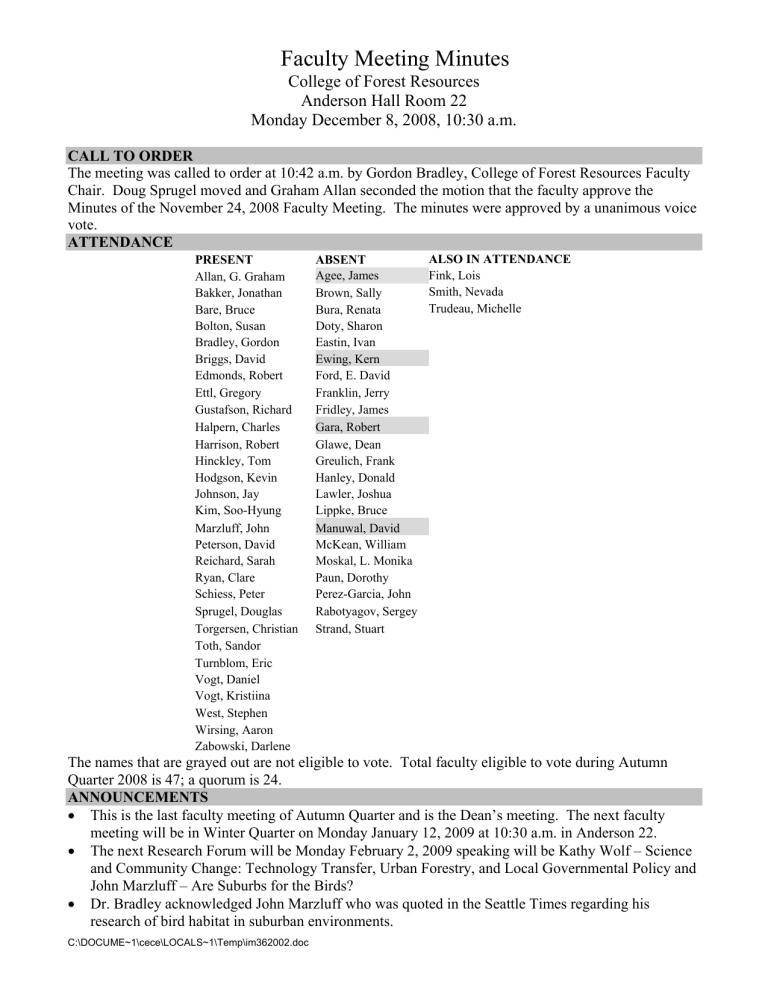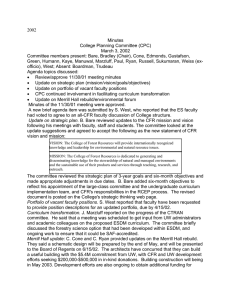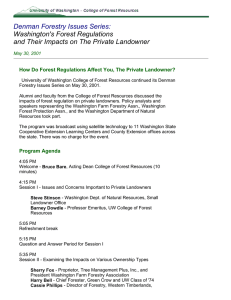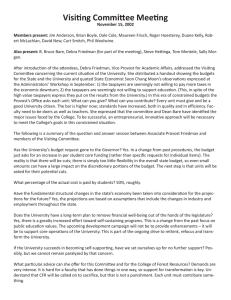Faculty Meeting Minutes College of Forest Resources Anderson Hall Room 22

Faculty Meeting Minutes
College of Forest Resources
Anderson Hall Room 22
Monday December 8, 2008, 10:30 a.m.
CALL TO ORDER
The meeting was called to order at 10:42 a.m. by Gordon Bradley, College of Forest Resources Faculty
Chair. Doug Sprugel moved and Graham Allan seconded the motion that the faculty approve the
Minutes of the November 24, 2008 Faculty Meeting. The minutes were approved by a unanimous voice vote.
ATTENDANCE
PRESENT
Allan, G. Graham
Bakker, Jonathan
ABSENT
Agee, James
Brown, Sally
ALSO IN ATTENDANCE
Fink, Lois
Smith, Nevada
Bare, Bruce Bura, Renata
Bolton, Susan
Bradley, Gordon
Doty, Sharon
Eastin, Ivan
Briggs, David Ewing, Kern
Edmonds, Robert
Reichard, Sarah
Ryan, Clare
Ford, E. David
Ettl, Gregory Franklin, Jerry
Gustafson, Richard Fridley, James
Halpern, Charles
Harrison, Robert
Hinckley, Tom
Hodgson, Kevin
Johnson, Jay
Kim, Soo-Hyung
Marzluff, John
Peterson, David
Schiess, Peter
Gara, Robert
Glawe, Dean
Greulich, Frank
Hanley, Donald
Lawler, Joshua
Lippke, Bruce
Manuwal, David
McKean, William
Moskal, L. Monika
Paun, Dorothy
Perez-Garcia, John
Trudeau, Michelle
Sprugel, Douglas
Torgersen, Christian
Rabotyagov, Sergey
Strand, Stuart
Toth, Sandor
Turnblom, Eric
Vogt, Daniel
Vogt, Kristiina
West, Stephen
Wirsing, Aaron
Zabowski, Darlene
The names that are grayed out are not eligible to vote. Total faculty eligible to vote during Autumn
Quarter 2008 is 47; a quorum is 24.
ANNOUNCEMENTS
•
This is the last faculty meeting of Autumn Quarter and is the Dean’s meeting. The next faculty meeting will be in Winter Quarter on Monday January 12, 2009 at 10:30 a.m. in Anderson 22.
•
The next Research Forum will be Monday February 2, 2009 speaking will be Kathy Wolf – Science and Community Change: Technology Transfer, Urban Forestry, and Local Governmental Policy and
John Marzluff – Are Suburbs for the Birds?
•
Dr. Bradley acknowledged John Marzluff who was quoted in the Seattle Times regarding his research of bird habitat in suburban environments.
C:\DOCUME~1\cece\LOCALS~1\Temp\im362002.doc
College of Forest Resources
Faculty Meeting Minutes
December 8, 2008
Page 2 of 4
PRESENTATIONS
No presentations were scheduled.
FACULTY ACTIONS
Consideration of CFR 509
•
Darlene Zabowski moved to remove CFR 509, Analysis of Research Problems as a required course in the curriculum. The faculty continued to discuss the issue. John Perez-Garcia, Chair of the CFR
Curriculum Committee stated that the Committee sent out a survey to graduate students who have taken the course. In addition, the Center for Instructional Development and Research (CIDR) has been contacted to evaluate the course to understand what is working and what is not. The instructors have made changes to this year’s course offering based on feedback from last year’s offering. As soon as the course evaluations for this quarter are available (which will be Spring Quarter), the
Curriculum Committee will be again considering the course and information will be brought to the faculty. Students with true hardships are encouraged to talk to Steve West, Associate Dean for
Academic Affairs, who has the authority to waive the requirement. Dr. K. Vogt stated it was her opinion that the course was not well designed and that it continues to not work well. Dr. Bradley would like to see the hard data being compiled by the Curriculum Committee. Dr. Marzluff said it would be good to consider the data and that it was ridiculous to ask to bring forward this motion at the last faculty meeting of the quarter. Dr. Ryan, most recent previous chair of the Curriculum
Committee, said that consideration of CFR 509 has been documented in previous Faculty Meeting
Minutes. Dr. Bradley stated that this item was not on the agenda circulated before the meeting and thus the motion was out of order in accordance with the College of Forest Resources By-Laws which states that “Agenda items shall be distributed to faculty prior to each meeting.”
DISCUSSION
•
Updates from faculty regarding the College of the Environment (CoEnv).
Rick Gustafson, who is serving on the CoEnv Vision and Governance Committee, reported that the
Committee was now considering the Vision more than Governance. The President and Provost will meet with the Committee on December 16 th
to provide feedback on the governance document. This document will be revised based on this feedback. Oceanography is in opposition to the CoEnv and
Fisheries is taking a wait and see attitude. Doug Sprugel asked if the Elected Faculty Council should be talking about “School of Forest Resources” governance at this time. He wonders if there will be
Chair and Director. Dr. Bare reminded the faculty that when he attended the last Faculty Meeting he said that he would be appointing a committee to look at CoEnv transitional issues.
•
Dean Bare took the floor.
1.
Dean Bare’s Agenda
•
Budget
Anticipated reductions
CFR budget review process
•
Report on meeting with the Senate Committee on Natural Resources, Ocean and Recreation
We are awaiting the Governor’s first budget which should be out sometime next week. At that time we will know which of UW’s requests made it into her budget. We will also know how she intends to address the deficit, which continues to grow. We should also find out if the Governor intends to look for new revenue sources or will we be expected to operate on existing sources. Also under question is whether or not the legislature will continue to allow UW to determine tuition levels for all but in state undergraduates, or will the legislature take this authority back partially or totally, e.g., would UW be allowed to set graduate and professional school rates of tuition, but not in state undergraduate?
C:\DOCUME~1\cece\LOCALS~1\Temp\im362002.doc
College of Forest Resources
Faculty Meeting Minutes
December 8, 2008
Page 3 of 4
Dr. Harrison spoke up about the cost of educating undergraduates. The state pays for only 25-30% of undergraduate education. He wonders if the UW will lobby for a substantial increase in undergraduate tuition on par with the budget cut?
Dr. Sprugel thinks we are in an unusually good position to know what is going on since Jim Fridley was recently appointed as the Deputy Faculty Legislative Representative for 2008-09 through the
Faculty Senate. He reminded faculty that the students consistently lobby for the opposite position from the UW Administration when it comes to tuition. President Emmert takes an active role though he does not always report on his negotiations, he is trying to strike the best deal for UW.
Dr. Bare stated that CFR will take an approximate $47,000 budget cut this year. If salaries are included in this cut, the money that would be paid in benefits would be included, because benefits are paid centrally for salaries paid on state budgets. The Dean has appointed an ad hoc Budget
Advisory Committee (BAC) to determine how the College would absorb budget cuts of 5%, 10%, or
15% in the next biennium. The BAC may make recommendations about how to manage the $47,000 budget cut, but their main concern is to gather input from the CFR community and then make recommendations regarding the 2009-11 biennium. Their final report is due March 16, 2009.
The College’s operating budget is roughly broken down as follows: 60% faculty salaries, 32% staff salaries, 4% TA salaries, 3.7% operations. This is what has been budgeted, but does not reflect actual expenditures. As has been pointed out in previous meetings, TA expenses are much higher than what our budgets support.
Dr. Ettl asked if capital projects were on the table? $2.5 million was requested to plan the Anderson
Hall renovation in the next biennium. This project may be delayed. Capital budgets are not allocated to units, so any budget cuts will be made separately.
Dr. Sprugel said that when Dr. Emmert presented to the Faculty Senate he said that the legislature’s sentiment was not to cut capital projects because they create jobs and stimulate the economy.
Dr. Bare discussed the Development staff. Development staff are funded directly by income derived from endowment funds. Currently CFR has 3.5 FTE in its Development office. The Consolidated
Endowment Fund’s asset value has declined, and thus Development is under severe pressure. Cuts to staff have been postponed for six months. The College of the Environment has hired Marilyn
Montgomery as Development officer. She will share CFR’s administrative assistant. Ramona will now be .5 FTE in CFR and .5 FTE in CoEnv. This doesn’t affect academic structure, only
Development office staffing.
Dr. Bare has asked CFR’s Centers and Cooperatives to prepare a report to look at all aspects of their operations including research, financial resources, and facilities. The goal is to determine if efficiencies of management and greater cohesion can be achieved in the future. In the CoEnv, the
Centers and Cooperatives may be put under the Institute of Forest Resources to promote a more collaborative and integrated approach to research.
Regarding the Human Dimensions faculty search: The Dean stated that an offer was made to a candidate but that it was not possible to close the process successfully. The Provost has announced a total freeze on faculty and staff hires. Dr. Bare has requested an exemption for this position and is
C:\DOCUME~1\cece\LOCALS~1\Temp\im362002.doc
College of Forest Resources
Faculty Meeting Minutes
December 8, 2008
Page 4 of 4 still waiting for clearance from the Provost. The search is still underway for the Research Assistant or Associate Professor in Fire Science. ChemE still has an open position for a bioresources faculty which is the position jointly held with CFR.
The Senate Committee on Natural Resources, Ocean & Recreation chaired by Ken Jacobson recently met to discuss the future of forestry education in Washington State. Dean Bare, Provost Wise,
Acting Dean Hartmann, and others were asked to attend. Some of the considerations discussed included the College of the Environment, Washington State University’s, possible elimination of their undergraduate forestry program, the UW Master of Forest Resources, forest technician education in Washington State, and the CFR’s efforts to better coordinate our programs with those of the community colleges as well as WSU. The invitees were allowed to make short presentations before responding to questions. The Senators asked hard questions related to the CoEnv. Hartmann addressed how the CoEnv could enhance CFR. Senator James Hargrove, committee member, said agencies prefer to hire OSU foresters because they have better technical skills. The forest technician programs at community colleges do a great job of training 2-year forest technicians. Students in these technical programs who then choose to pursue a bachelors degree program at a 4-year institution must spend an extra year completing general education requirements – which leads to a
(2+3+1 (MFR)). There is another track offered at community colleges that better prepares students for a four year degree program (2)2+1 (MFR)). The future of forestry at WSU is unclear. A number of their faculty will be retiring and the program may be eliminated. In addition, WSU is considering forming a School of Environment and Natural Resources which would include elements of the forestry program. The WSU forestry students could finish their degree programs at the UW and we would like to work out an agreement for them to do so, but they could form an agreement with
Idaho, too. Susan Bolton asked if there were any “real” statistics presented regarding the Oregon hires. Dr. Bare said no.
The College’s Federal budget earmarks have been submitted. It is unclear if the UW administration will move forward with our requests. We are also asking for earmarks at the state level. If we don’t ask, we won’t get anything; Dr. Bare is always optimistic that we’ll get money. The Federal earmarks that were requested were for continued support of the Canopy Crane, CINTRAFOR,
ONRC, and for equipment to build the bioresource program. The bioresource equipment request was put in with Chemistry and Chemical Engineering. We also requested funds to have a curatorial building at UWBG constructed.
Tom Hinckley reported on the College of the Environment’s Research Institute. The Institute has about
$750,000 plus an endowment that should yield between $100,000 and $150,000 per year. A Request for
Proposals will be released inviting people to submit proposals. It is expected 5-10 proposals will be awarded sometime during early 2009. The College’s faculty will be notified as soon as the RFP is public.
UPCOMING EVENTS
•
The next Faculty Meeting will be on Monday, January 12, 2009 from 10:30 to 11:30 a.m. in
Anderson Hall Room 22. This is the Dean’s meeting and agenda.
ADJOURNMENT
The meeting was adjourned at 11:30 a.m.
C:\DOCUME~1\cece\LOCALS~1\Temp\im362002.doc



